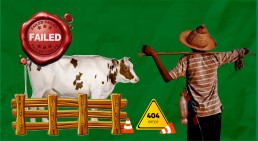
THE RUGA CONTROVERSY
There has been a lot of controversy regarding the Rural Grazing Area (RUGA) policy plan presented by the Federal government in June this year. Conceived as a solution to the challenges of herdsmen grazing in the country, the plan for the RUGA scheme is to provide communities where herders can live and grow cattle and cease nomadic grazing activities, an economic activity that has fueled incessant conflict/violent clashes responsible for loss of lives and property.
The Ethnic undertones limiting the adoption.
Interest groups, state governments and socio-political groups alike have decried the scheme. A primary undertone that contributed to why the scheme was balked at is the factor of ethno-religious distrust in the nation. I will explain why. You see, over the years, the ravaging effects of the conflicts that has occurred in many communities has created a sense of distrust and hostility towards the herdsmen.
There is a founded fear that if the scheme is adopted as presented, in no time, the grazing communities will contribute to a population explosion of Fulani herdsmen that may not only threaten the resources of the host communities but based on their precedence, stir up violent conflicts to promote their interest. Some saw it as a land grab agenda in Favour of the Fulani.
After much backlash the Ruga initiative has been suspended till further notice.
Aside the negative buzz, is the underlying rational for RUGA a viable solution or can it be modified to deliver impact.
THE CORE THRUST OF RUGA
The original intention of the RUGA policy was to solve the Fulani herdsmen crisis, but for the discerning, the fact that the Government is interested in investing resources in creating livestock farming communities across Nigeria, is a good thing. However, what most people do not agree on is the unilateral ethnic reason for this investment and how they want to go about it.
SO LET’S START WITH WHAT WE ALL AGREE ON.
- Livestock farming is a market opportunity we can profit from as a nation: Livestock agribusiness currently accounting for an estimated one-third of Nigeria’s agriculture GDP. Forecasts also show that estimated population growth will lead to increase in demand for livestock-source foods with consumption rates tripling to over 200%. This demand translates to increased productivity and profitability.
- Livestock farming industry is in need of significant investment: Because livestock farming is a capital-intensive venture, our current livestock productivity is low. With our dependence on imports to meet the demand for meat, this shows a glaring need for investment from both public, private and foreign investment financing. There is also a big need for investment in production-enhancing technology that increases the quality of production and positions the livestock sector to adhere to global energy demands in the campaign against climate change.
- We need to get more youths engaged in livestock farming thereby reducing unemployment rates: Besides the extensive value chain that guarantees dairy products, fertilizer source for farms and even land labour, the livestock industry holds great potential for employment opportunities for young people. Across research, animal medicine(veterinary), livestock feed production, processing and storage systems, machinery and technological adaptation, distribution and even the livestock farming itself, there are gainful opportunities exist to further strengthen the capacity of the sector to provide sustainable livelihoods.
- The need for peace and end to the conflict: In the past couple of years, violent clashes between sedentary farmers and nomadic livestock herders has escalated leading to a primary cause of insecurity in the nation. From disputes over land use, crop destruction and cattle theft that has led to loss of lives and property, this conflict complicates the lines of ethnic and religious relations leading to distrust. However, the agriculture sector is bigger than ethnic or religious grouping and will yield better returns if mechanisms for conflict resolution, collaboration and peacebuilding are established and strengthened across multi-ethnic levels.
WE NEED A CHANGE IN PERSPECTIVE.
In other to come up with a policy that will be widely accepted by everyone, Our policy makers will need a change in perspective as opposed to solely coming up with a solution to the Fulani herdsmen conflict, they will need to pivot their new policy as a solution designed to jumpstart the livestock industry whilst promoting ethnic harmony between the Fulani herdsmen and other ethnicities.
THE NEED FOR A NEW POLICY THAT TACKLES YOUTH UNEMPLOYMENT AND IMPROVES ETHNIC TOLERANCE.
Powered by this change in perspective, we can formulate a new policy that adheres to the following guidelines.
- In partnership with the private sector, we will need to fund and support the adoption of scientific breakthroughs, restoring vast land mass in the Northern region to enable fertile vegetation for grazing thus reducing the need to move around in search of land and the resulting excesses that fuel conflict between farming communities and nomadic herdsmen.
- The policy plan should be designed with the end goal of ensuring that states are self-reliant in livestock production and distribution. For this to happen, it will be a private sector and state led initiative for sustainability, with government providing funding support to the states and the states partnering with private companies that will be entrusted with the responsibility of running and managing the ranches for a fee.
- As opposed to limiting the scheme to Fulani herdsmen, open it up to all Nigerian youths. Let it be an initiative targeted at getting more youths farming and creating more employment opportunities that come with building and establishing (infrastructure) in these settlements across states.
- To achieve its original goal of easing ethnic tension, we can do that by promoting multiethnic collaboration. We can borrow a leaf from the co-working space phenomenon, where different companies operate from one location. This state owned and privately managed co-working ranches as a matter of policy, will have a leadership structure and work force that is multiethnic that will allow everyone-Fulani and indigenes alike, who wants to run a cattle rearing business to utilize the resources in these ranches to grow their venture.
- Enlist and re-orientate herdsmen and members of the communities where this privately run ranches will operate to this new reality, ensuring both parties serve as peace agents that champion conflict prevention, ultimately fostering progress and development for the state.
The fact is we need sustainable solutions that will unlock the abundant potentials and resources in our nation’s agriculture sector. We will need enduring, trans-generational solutions to cater for the growing number of mouths to feed and we will need to go at these issues together as a nation.
What are your thoughts? Do you think the element of youth enterprise and sustainability is instrumental in the discussion of the policy?

About the Author
Century Favour is an Entrepreneur, Strategy, Technology, Marketing and Creative professional passionate about driving economic & social impact. Through his ventures (Endgame The Strategy Company, Do take action & centuryfavour.com) he works to ensure that People, Businesses, Governments & Non-Profits grow, succeed, achieve their strategic objectives, drive sustainable development and positively shape the future of the people & communities they serve.

About the Author
Century Favour is an Entrepreneur, Strategy, Technology, Marketing and Creative professional passionate about driving economic & social impact. Through his ventures (Endgame The Strategy Company, Do take action & centuryfavour.com) he works to ensure that People, Businesses, Governments & Non-Profits grow, succeed, achieve their strategic objectives, drive sustainable development and positively shape the future of the people & communities they serve.
